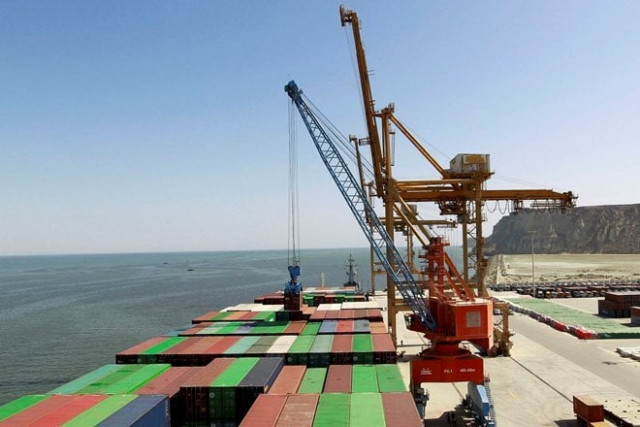China gives fresh assurance on CPEC financing
Beijing will continue concessional lending, says Ahsan Iqbal

Beijing will continue concessional lending, says Ahsan Iqbal.
PHOTO: REUTERS
This was stated by Federal Minister for Planning & Development Ahsan Iqbal on Monday while talking to media.
He said the assurance to honour commitment for giving concessional loans was given by Chinese ambassador to Pakistan in a 54th CPEC review meeting.
It was the last review meeting by the outgoing government in which Iqbal left the unfinished CPEC agenda at the mercy of bureaucracy. His government struggled to initiate work on Mainline-I project (initially estimated to cost $8.2 billion), $2 billion Karachi Circular Railway, Gwadar projects, small road projects of Azad Jammu & Kashmir and Gilgit Baltistan, and prioritised Special Economic Zones in all the provinces.
Pakistan’s debt may be soaring, but it has its benefits
But the Pakistan Muslim League-Nawaz government has managed to “energise $30 billion projects” and made the CPEC a reality in a period of four years, said the minister while counting his government’s successes on the CPEC front.
In April 2015, the Chinese president had formally inaugurated the $60 billion CPEC as part of his broader strategic Belt and Road Initiative. Except for energy and some road projects that connected Gwadar port to Chinese borders, the progress on other schemes, including industrial parks, remained far below expectations.
It was also the first meeting that Iqbal chaired after an unsuccessful bid at his life by an extremist. “God has given me a new life to complete the CPEC and also to work for ending extremism from the country”, the minister said.
Iqbal, who also holds the portfolio of the interior minister, said the authorities on Monday reviewed progress on those schemes that were facing delays.
The minister hoped that the Gwadar Master Plan will be ready in the next four months, which is already falling behind the original schedule by at least one year. Iqbal said that land survey and water feasibility studies have been done.
According to the estimates, the Gwadar city’s population, which is currently estimated at 125,000 people, is expected to increase to 300,000 by the year 2025. By the year 2035, it will soar to 600,000 people but from that point it will increase to two million people by the year 2050.
Concessional financing
The Chinese ambassador assured that China would honour its commitments to provide concessional financing for some of the CPEC projects, the minister said.
All those projects where Chinese concessional financing was involved were put on hold after China set up a new government agency, the China Aid. Earlier, these projects were looked after by the Ministry of Commerce of China, according to Iqbal.
The minister said the Chinese ambassador stated that the delay in processing the financing occurred due to transfer of concessional loans subject from the ministry to China-Aid.
To a question, the minister said that due to the same reason, the ML-I project also faced hurdles. “We hope that China will soon share the financing details of the ML-I project”, he said.
Iqbal said the Ministry of Railways has also been given instructions to share the details of its feasibility with the Planning Commission for scrutiny.
Last month, Pakistan delayed approval of the Mainline-I project after Beijing tagged the phase-I of the scheme at $4 billion, which was $627 million higher than Pakistan’s estimates.
According to the Framework Agreement of the ML-I, China will provide 85% of the project cost as a concessionary loan. The ML-I project has been declared “strategically important” by both countries.
The minister again repeated his six months old instructions to the Ministry of Railways and the Sindh government to resolve their differences over the alignment of $2 billion Karachi Circular Railways. He hoped that both the parties would address their issues in one month.
Russia to become part of game changer CPEC
Iqbal said it has also been decided in the meeting that the relevant government ministries would complete all the pending feasibility studies of small road projects of the AJK and GB in the next four months. Pakistan and China had agreed to make four new roads as part of the CPEC in November 2016 but subsequently no progress was made on them.
The minister hoped that till the time the new government is in the office, these ministries would complete their homework.
He said it was also decided that the Board of Investment would look for a piece of land in the adjoining areas of Islamabad Capital Territory for the construction of a Special Economic Zone.
The minister underlined the need for having a stable economic framework coupled with political stability and peaceful environment for the continuity of the economic journey.
With CPEC, climate favourable for growth of IT start-ups
Iqbal also encouraged the provinces to provide incentives for relocation of Chinese industries into Special Economic Zones. The progress on these nine zones, which can transform Pakistan’s economy, is at standstill due to provinces differences over tax incentives and bureaucratic hurdles.


















COMMENTS
Comments are moderated and generally will be posted if they are on-topic and not abusive.
For more information, please see our Comments FAQ